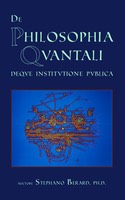by Stephen Berard, Ph.D.
REVISED EDITION COMING IN 2014:

Product Details | Preview Pages PDF
Available in paperback and eBook editions.
In De Philosophia Quantali, Stephen Berard continues the centuries-old tradition of scientific writing in Latin. A professor of linguistics and languages and life-long promoter of the natural sciences, he interprets the current extraordinary findings of quantum mechanics in such a way that the educated and attentive reader, though not schooled in physics, will definitely be able to follow.
It is often the case today that those coming from Hindu or Buddhist traditions have no problems with such quantum concepts as non-locality, atemporality, parallel realities, and an infinity of universes. Westerners, however, even those schooled in the sciences, are usually not exposed to such concepts in any kind of depth until they are in graduate school. Thus, in the West, students typically form a worldview based on classical, macroscopic, Newtonian-Einsteinian physics, a subclass or special case of quantum physics, rather than on the most basic and universal elements of physical science, which are quantum in nature.
Berard argues against the trend seen in most Western countries to ignore the most fundamental science at the lower levels of education. De Philosophia Quantali elegantly makes the case that a worldview founded on quantum principles is far more holistic, opening large doors to the less linear and even more mystical aspects of life.
Berard uses quite a few specialized terms and concepts — all of which are explained both in the text and in the final glossary — so that the reader can be confident that he or she is acquiring a deeper understanding of the material than can be gained from typical popularizing science books.
In this well organized work, after a clear and informative introduction, the results of quantum experiments are first presented, then the most influential interpretations of these results are critically examined. Finally the scientific material is placed in the context of the main currents in the history of philosophy.
In the conclusion, the author proposes that instructors in all disciplines, not just the sciences, pay much greater attention to the message of holism with which quantum physics clearly presents us.
For more information, write to Stephanus Berard.